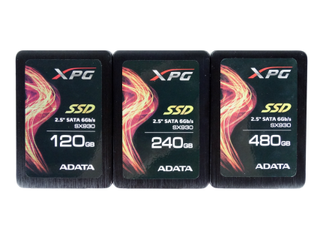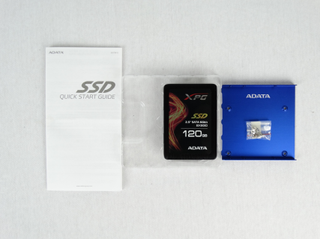Adata Releases SX930 Flagship SSD With eMLC, JMicron Controller

Prior to Computex we published a preview article detailing the new JMicron JMF670H controller. Two of the three drives we tested arrived with Adata-branded NAND, so we knew this product was coming. What we didn't know is that the company planned to make the new SX930 a flagship product with eMLC flash, a full accessory package and a long five-year warranty.
The new Adata SX930 comes in three capacity sizes: 120 GB, 240 GB and 480 GB. Adata leverages the JMF670H controller's advanced BCH ECC with Micron 16nm eMLC flash to strengthen endurance. The SX930 boasts 72 bits per 1 KB ECC. The high endurance rating allows Adata to offer this product with a long five-year warranty.
The SX930 SSDs use Adata's exclusive new pSLC Cache Technology and a DDR3 cache buffer to deliver up to 560 MB/s sequential read performance and up to 460 MB/s sequential write performance.

As Adata's new flagship model, the SX930 ships with a full retail package that includes a hefty accessory package that takes us back to 2010 lavishness. Included in the package is a desktop adapter bracket with mounting screws, a quick start guide and Adata's SSD Toolbox software (which is downloadable).
Adata takes flagship pricing to new levels with the SX930, as the SX930 480 GB has an MSRP of just $200. The 240 GB model will sell for $110, and the 120 GB model comes in at just $80. MSRP prices usually fall off after a few weeks on the market, so we expect the SX930 to be a powerful contender in the low-price SSD arena, a venue in which Adata has experience.
We have all three capacity sizes in for testing, and the preliminary results are promising compared to other products in this price range.
Follow us @tomshardware, on Facebook and on Google+.
Stay on the Cutting Edge
Join the experts who read Tom's Hardware for the inside track on enthusiast PC tech news — and have for over 25 years. We'll send breaking news and in-depth reviews of CPUs, GPUs, AI, maker hardware and more straight to your inbox.
-
RazberyBandit Samsung has had a pretty tight grip on the price/performance ratio since its 850-EVO lineup was released. I've been hopeful something would come along this year to change that, and I guess we'll see if ADATA has created a rival when your testing results are released.Reply -
gangrel I find the ECC very appealing; even if it doesn't measure up on the p/p, that aspect will make it worth considering.Reply -
f-14 ReplySamsung has had a pretty tight grip on the price/performance ratio since its 850-EVO lineup was released. I've been hopeful something would come along this year to change that, and I guess we'll see if ADATA has created a rival when your testing results are released.
samsung has a pretty tight grip on memory, because they are a manufacturer. the margins for competing against a maker of the parts your product needs most is in the negative when it's one of the best manufacturers for parts for your product. everybody else pays a selling price and deals with middlemen, manufacturers have no such and thus less overhead makes it difficult to compete with price wise. -
RazberyBandit Reply16274601 said:samsung has a pretty tight grip on memory, because they are a manufacturer. the margins for competing against a maker of the parts your product needs most is in the negative when it's one of the best manufacturers for parts for your product. everybody else pays a selling price and deals with middlemen, manufacturers have no such and thus less overhead makes it difficult to compete with price wise.
I agree. Because Samsung controls the near entirety of its SSD production and doesn't have to go outside of itself for much of anything, if at all, it can offer its SSDs at great prices. The only companies that can come close to that are Crucial and Intel. Intel's stuff tends to carry a higher cost due to the R&D, but Crucial's BX100 SSDs come in a close second to Samsung's 850-EVO. Sadly though, even if the BX100 drives were suddenly equal in price or cheaper, Samsung has Crucial's warranty topped by two more years.
Samsung positioned itself extremely well and is incredibly tough to beat presently in the SSD market.
Most Popular


